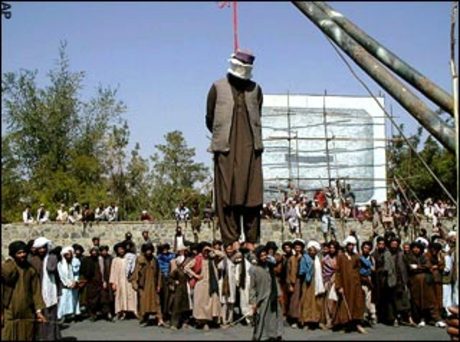
Amanda Hodge, South Asia correspondent
May 08
TALIBAN militants are using civilians in Swat Valley towns as human shields and planting mines in girls' schools across Buner, say residents and the Pakistani military.
As intense fighting continued across Pakistan's North West Frontier Province, thousands of civilians fled the Swat Valley and Buner yesterday, taking advantage of a brief relaxation in military-imposed curfews.
The former tourist region of Swat has experienced the deadliest fighting between militants and the military since February, when a peace deal was struck to end the Taliban's 18-month campaign for imposition of sharia law.
At least 35 militants had died in fighting, as had nine Pakistani soldiers, the military reported. About 36 civilians have been killed in crossfire or by army snipers for breaching curfew.
Security officials said Taliban fighters had begun entering houses in Swat's main town, Mingora, and were using residents as human shields. The Government insists no formal army operation has begun in Swat, the stronghold of Taliban in the NWFP, and that all military action was retaliatory. But in Buner district, where the military's Operation Black Thunder is in its second week, the civilian toll is mounting fast.
A few kilometres from Buner, a makeshift refugee checkpoint clogs the main highway to Mardan. Mini-buses, trucks and tractors line the road competing with registration tents, soup kitchens and health clinics - all catering to thousands of displaced people who arrive each day. Officials say at least 5000 have registered in recent days.
From overcrowded vehicles piled with blankets, bags and livestock, exhausted men, women and children spill out.
At a checkpoint on the border with Swabi, an elderly teacher said many of the houses in his upper eastern Buner village of Kalpani, had been destroyed since the "military invasion" began on Monday. On that day four army tanks rolled into town. At least one has since been blown up.
The man gave his name but asked that it not be used, fearing Taliban reprisals. While his school was untouched by the Taliban, many of the girls' schools in his village were laid with mines.
Thousands have lost homes and livelihoods, some their lives. But as far as he knows, no Taliban. "We are between the militants and the military," he told The Australian. "We're running from both of them."
A young farmer from Chamla, at the gateway to Buner, who arrived four days ago with his young family, said at least 10 Taliban fighters entered his village last month, brandishing AK47s, rocket launchers and grenades. "They told us, 'You should defy the Government. In case of non-compliance you will face serious consequences'," he said. "People are afraid of the Taliban. When they came to our village no one dared speak to them."
A Swabi college lecturer helping out with registrations said people across the NWFP were scared for their country.
"On the one hand, we have a nuclear bomb and on the other we have a begging bowl," he said. "The dictators have made us a nation of beggars."
But Bakht Salam, a farmer from the town of Batch Katta, said he did not leave his home for fear of the Taliban.
"They don't scare us," he said. "We're scared of the military."
His family fled on foot with 12 other families, after the military sent in F16s and helicopter gunships to bomb and strafe his town and the surrounding hills, where Taliban were suspected to be hiding.
They left behind their belongings and a wheat harvest.
"We brought nothing with us. There was no time because people are stranded in their houses and when they lift the curfew you just have to run," he said.
Several people who broke the curfew, including two mentally disabled children, were shot by the army, he said.
Pakistan President Asif Ali Zardari and Social Welfare Minister Sitara Ayaz appealed for international aid this week to care for the swelling ranks of displaced.
Mr Zardari said Pakistan faced "the world's largest internal displacement" and that without aid, the camps and communities that host the more than one million left homeless by the fighting would become militant recruitment grounds.
Independent defence analyst Ayesha Siddiqua said the lack of military strategy and human collateral damage could make the NWFP a no-go zone for the rest of Pakistan.
Source: The Australian




















